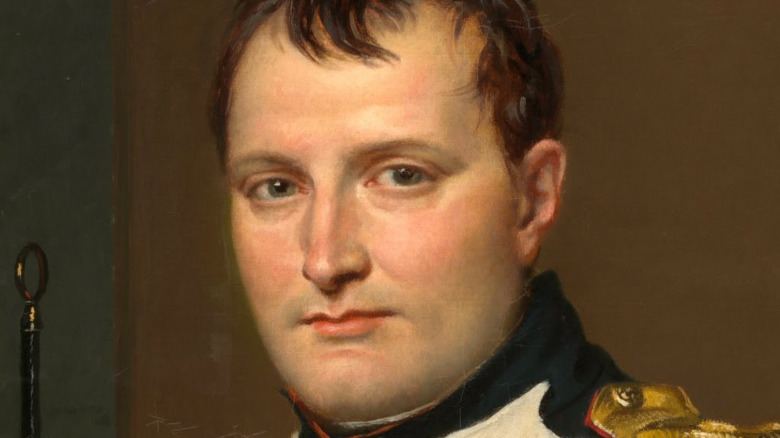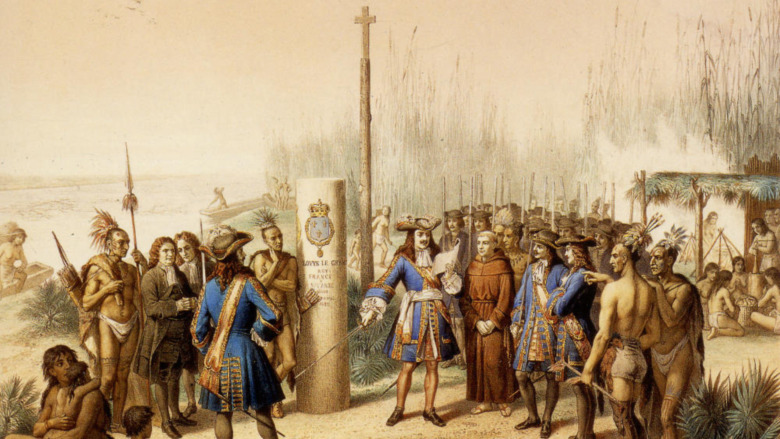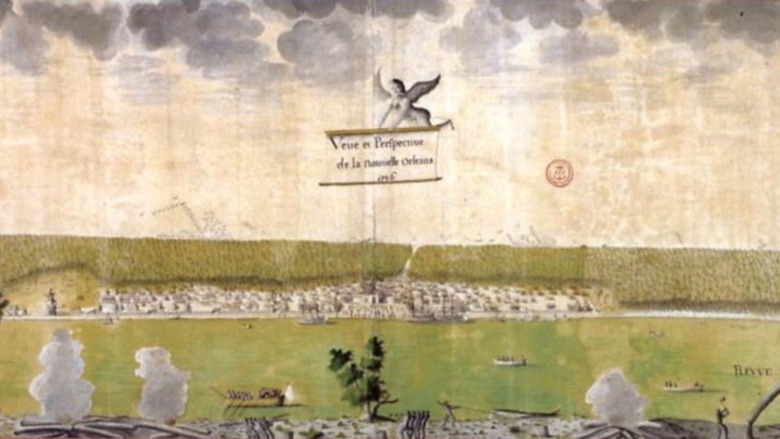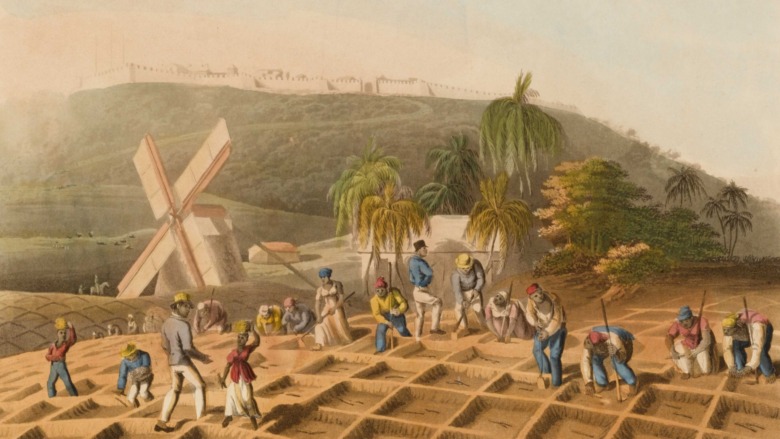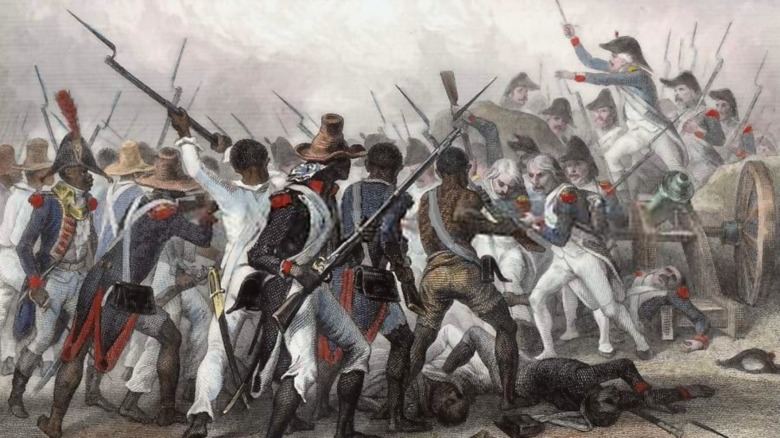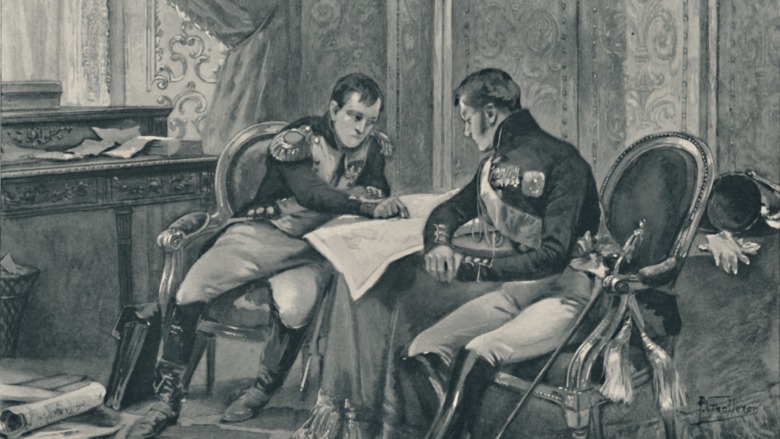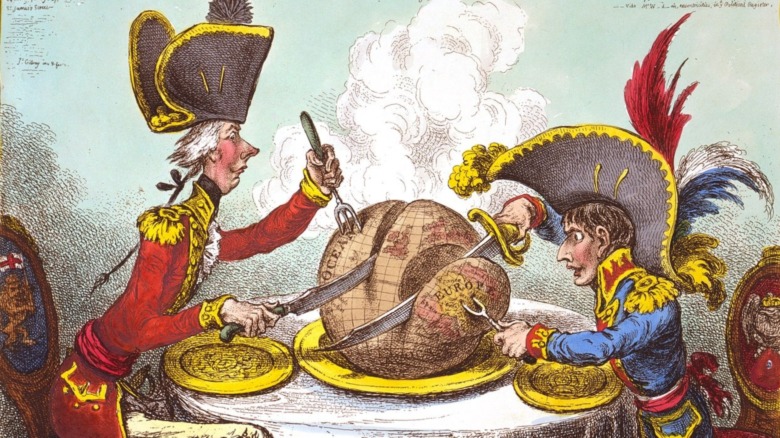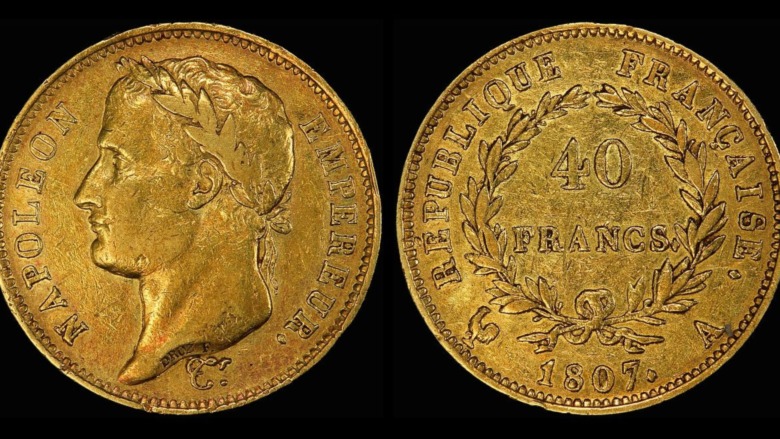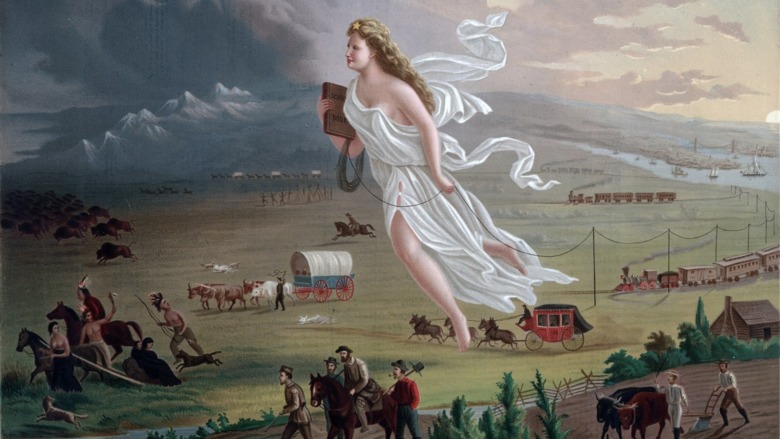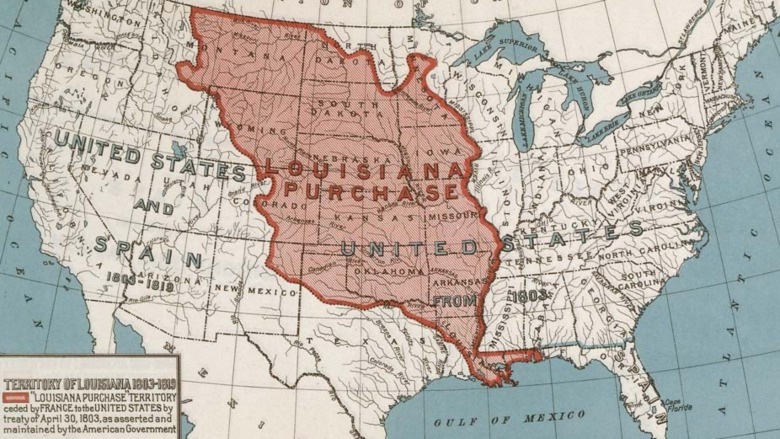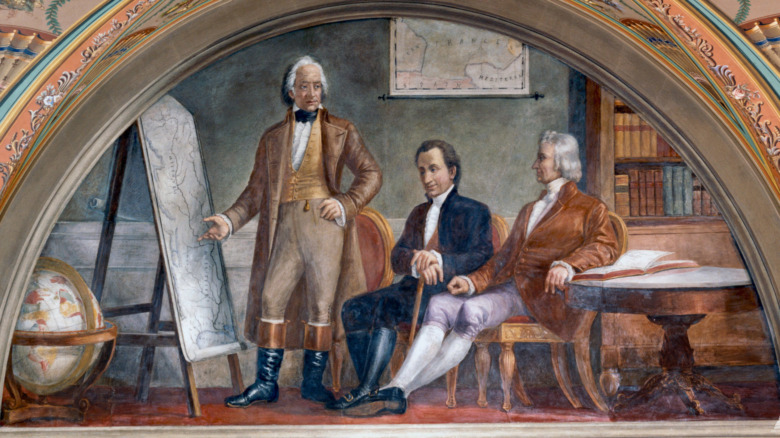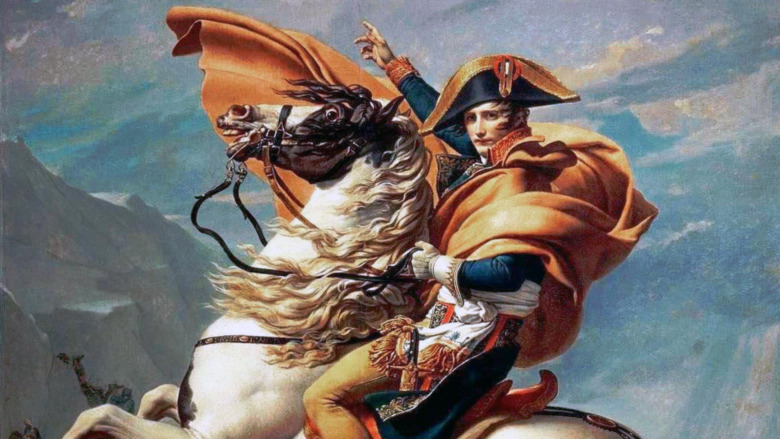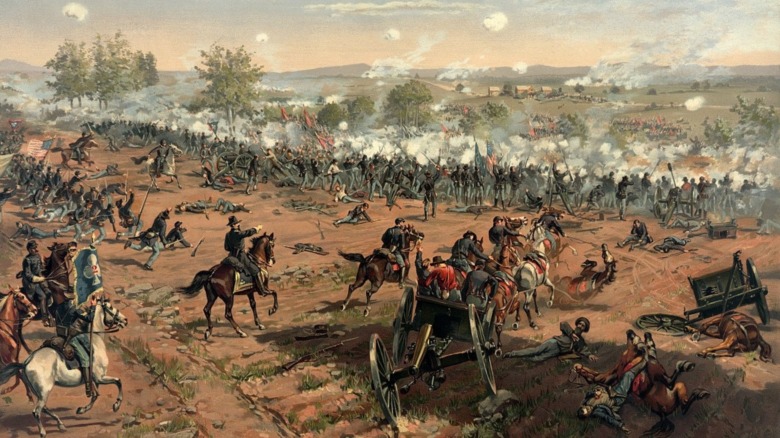The Real Reason France Sold The Louisiana Territory To The United States
Everybody who has taken grade-school history knows the story. In 1803, President Thomas Jefferson bought the Louisiana Territory from France for $15 million and nearly doubled the size of the U.S. The Lewis and Clark expedition followed shortly thereafter. The Louisiana Purchase was the start of the United States' incredible expansion from a group of Eastern Seaboard states on the North American continent. Manifest destiny was in full effect. However, as Slate Magazine describes, the United States did not so much buy the land but rather the imperial rights to conquer it and take it from the Native Americans who'd lived there for millennia.
Among Eurocentric circles, the Louisiana Purchase was seen as one of the greatest land deals in history. That leads to the question as to why on Earth would France sell so much land, or at least the rights to it — 828,000 acres for what amounted to 4 cents an acre? Even in 1803, that was dirt cheap. National Geographic points out that in modern dollars, the Louisiana Purchase would have cost $342 million.
As it turns out, France, or more accurately its ruler Napoleon Bonaparte, had some good reasons for doing it.
Louisiana was used to changing hands
The Louisiana Territory was established, as described by Smithsonian Magazine, in 1682, when the French explorer Robert Cavelier, Sieur de La Salle, arrived at the mouth of the Mississippi River, put up a cross and column, and declared to a group of puzzled Native Americans that the entire river basin belonged to France. The vast territory was named after Louis XIV, the so-called Sun King. In 1718, the French established New Orleans, and scant groups of colonists moved in.
However, the territory, like a regifted picture frame, was swapped among European powers. In 1763, Louis XV gave Louisiana to his cousin, Charles III of Spain. It remained in Spanish hands until 1800, when Napoleon Bonaparte negotiated a secret treaty with Spain and took the vast holding back in exchange for tiny Etruria in Northern Italy. Napoleon's goal: an American empire.
This secret deal did not remain secret for long. When the United States found out that instead of Spain as their neighbor, it was to be France under Napoleon with imperial ambitions, the Americans feared that their access to the Mississippi would be cut off. As a result, Thomas Jefferson instructed James Monroe and Robert Livingston to purchase New Orleans in 1802. The rest was history.
To the French, Louisiana was an undeveloped backwater burg
Even though Europeans had ostensibly laid claim to Louisiana for centuries, it remained largely undeveloped, with few wanting to move there. As described by Louisiana State University, France even went so far as to send convicts from debtors' prisons to the colony in 1717 in order to increase its settlement. This was coupled with the importation of enslaved Africans. By the 1720s, several settlements had developed, the chief of which was the territory's capital at New Orleans.
According to the Library of Congress, the Louisiana Territory was mainly ignored by the French government and remained unprofitable. It was even subject to a speculative bubble which ruined fortunes. Louisiana under Spanish control fared little better. As a result, while the territory of Louisiana was technically very large, it had hardly been touched by the Europeans, with the exception of the areas along the lower Mississippi River. To France, it was a backwater — sort of like owning Mediterranean Avenue in Monopoly. When it came to profit and geopolitical importance, Napoleon was far more interested in the Caribbean.
France was far more interested in the Caribbean than North America
The jewel of the French overseas empire was Saint-Domingue in the Caribbean, which is today's Haiti on the large island of Hispaniola. As the Library of Congress describes, Saint-Domingue was incredibly valuable. In the 1780s, it produced 60% of the world's coffee and supplied Britain and France with 40% of its sugar. Brown University explains that Saint-Domingue created a tax revenue base of 1 billion livres and exported up to 170 million livres into France on an annual basis.
The problem with Saint-Domingue was that its entire economy was supported by and depended entirely upon slavery. According to Slavery and Remembrance, the French imported nearly 800,000 enslaved Africans to the colony for brutal plantation work in what was one of the most violent slavery systems in the Americas. Slaves were routinely terrorized in a race-based social order. According to the University of Kentucky, slaves outnumbered free people at least 10 to 1. Saint-Domingue was a powder keg, ready to explode.
The Haitian Revolution threw everything up in the air
In 1791, influenced by the ideals of the French Revolution, a slave revolt broke out on Saint-Domingue. As described by History, under the leadership of Toussaint Louverture, the enslaved allied with nonwhite free people and successfully overthrew the slave order, taking control of all of Hispaniola, not just Saint-Domingue.
This success stuck in Napoleon's craw. In 1799, he had seized power in a coup d'état in France and wanted to restore French glory in the Americas. He wanted Saint-Domingue and its incredibly profitable sugar and coffee plantations restored and under French control, with the old system reinstated. According to the Library of Congress, Napoleon did not have enough troops to occupy Louisiana while simultaneously subduing Saint-Domingue. His strategy was to use Louisiana to supply the flour, salted meat, timber, and other resources necessary to support his troops on the island colony. While this strategy was successful at first, by 1803, disease and heavy casualties forced the French to withdraw. On January 1, 1804, Haiti declared its independence.
It was the first and only time that a slave revolt had seen such success, and this epochal event in San-Domingue is linked with the Louisiana Purchase. Southern Quarterly notes, "What is often remembered as a remarkably 'peaceful' transfer of land was in fact predicated on events of enormous violence that took place in the Caribbean."
Napoleon wanted to stick it to the British
The French loss of Saint-Domingue sent a shudder through the world. As explained by Medium, in 1803, even before final Haitian independence, it had dawned on Napoleon that his prospects for developing an American empire were growing increasingly faint.
Without the profits from Saint-Domingue, it did not make sense to try to defend the sprawling Louisiana Territory, and Napoleon was worried about the British. The two powers were at peace in early 1803, having signed the Treaty of Amiens in 1802, which, as explained by Britannica, ended hostilities between the two nations. This respite gave Napoleon breathing room in his failed attempt to recover Saint-Domingue.
With the failure to retake Saint-Domingue and the inevitability of renewed war between France and Britain, Napoleon refigured his political calculus. He could not or did not see the value in sending troops to defend worthless Louisiana, not with Saint-Domingue out of the equation. He also realized that with Britain's superior naval power, it would be relatively easy for them to take Louisiana at will. Napoleon was reported to have said of Louisiana in his treasury minister's memoir, "To attempt obstinately to retain it would be folly."
What Napoleon needed was a way to divest himself of the territory while at the same time preventing it from falling into British hands. The answer fell into his lap.
Napoleon inadvertently scared the United States into it
The Library of Congress explains how President Thomas Jefferson realized the precariousness of having France as a neighbor. Aside from the obvious drive for conquest by Napoleon, he knew that when war started between the two countries, Britain would attempt to take Louisiana. This created an unstable situation at the western border which could draw his young country into the Napoleonic Wars. In a letter, Thomas Jefferson wrote that France's repossession of the territory "is the embryo of a tornado which will burst on the countries on both shores of the Atlantic and involve in it's effects their highest destinies."
As a result, the State Department describes how the president began military preparations along the Mississippi and sent James Monroe to France with authorization to buy New Orleans and West Florida for up to $10 million. This would allow the Americans to retain clear access to the river. Monroe, along with the minister to France, Robert Livingston, made the inquiry. As told by Michigan State University, both of them were shocked when the French minister, Charles-Maurice de Talleyrand, asked how much they would pay for the entire territory.
Napoleon needed money
Napoleon saw in the sale of Louisiana something he needed more than anything else — cold, hard cash. The French ruler was just about to embark on a series of devastating wars. These wars, the Napoleonic Wars, lasted from 1803 to 1815 and led, as described by the New World Encyclopedia, to a brief French dominance of Europe. In order to finance his dreams of conquest, Napoleon needed money to finance his military operation, which had been growing in an arms race with Britain. PBS describes how by 1812, France had increased its army strength to 600,000 men, not to mention the thousands in the navy. All these soldiers needed to be fed, housed, and paid.
As discussed in the Journal of Economic History, France had a historically bad reputation for credit and finance due to the upheavals of the French Revolution. This made it difficult, when compared to Britain, to obtain the necessary money to wage large-scale wars. As a result, Napoleon's view of Louisiana transformed from that of an outpost to that of a poker chip, ready to cash in. This was emphasized when in the memoir of François Barbé-Marbois, Napoleon gave up his claim to the territory saying, "Irresolution and deliberation are no longer in season. I renounce Louisiana. ... I know the price of what I abandon ... I renounce it with the greatest regret." He added later, "...I require money to make war on the richest nation in the world."
France had a very willing buyer in the United States
Aside from the strategic reasons, the United States was the best market to sell the Louisiana Territory. As detailed by the Smithsonian American Art Museum, Americans believed that the acquisition and settlement of new lands to the west were critical to the future development of the country. While the concept of "manifest destiny" would not make it into the American lexicon until 1845, the idea that the United States had a divine mission to expand had been in place since the earliest colonial times. The key to opening the western goal was securing the Mississippi River and the Louisiana Territory. When Monroe and Livingston were offered the opportunity to buy the entire territory, they could not help but be excited. They wrote an enthusiastic letter to Secretary of State James Madison:
"An acquisition of so great an extent was, we well Know, not contemplated by our appointment; but we are persuaded that the Circumstances and Considerations which induced us to make it, will justify us, in the measure, to our Government and Country."
Napoleon thought a bigger America would destroy itself
To Napoleon's line of thinking, if the United States took control of Louisiana, then it would deny Britain the opportunity of conquering it. What's more, as described by Medium, the French ruler believed that a more powerful United States was better for France. First, an empowered United States could effectively act as a formidable rival to Britain. This could weaken Britain's war effort against France and give Napoleon victory. In a way, this almost came to pass in the War of 1812.
However, one has to question whether the French ruler considered the consequences of selling France's interest in Louisiana. Would that make the United States too powerful? According to the memoirs of François Barbé-Marbois, in what was a prophetic statement foreshadowing the American Civil War, Napoleon said, "Perhaps it will also be objected to me, that the Americans may be found too powerful for Europe in two or three centuries: but my foresight does not embrace such remote fears. Besides, we may hereafter expect rivalries among the members of the Union. The confederations that are called perpetual, only last till one of the contracting parties finds it to its interest to break them, and it is to prevent the danger, to which the colossal power of England exposes us, that I would provide a remedy."
Napoleon was also lousy negotiator — or maybe not
The Historic New Orleans Collection provides more nuance to the negotiations of the Louisiana Purchase. On April 12, 1803, François Barbé-Marbois met with the Americans. In the meeting, he said that Napoleon had read an account in the London press that 50,000 British troops might be sent to New Orleans. While this was just a rumor, he had made up his mind to sell the territory. The asking price was $125 million. Livingston and Monroe were only authorized to spend up to $10 million for the purchase of New Orleans and West Florida. Livingston wrote to James Madison, "We shall do all we can to cheapen the purchase, but my present sentiment is that we shall buy."
By April 30, 1803, they hashed out an agreement where the Americans would pay $15 million, a considerable reduction, although its constitutionality was debated. Regardless of its legality, Smithsonian Magazine details how in order to finance the transaction, several British banks actually bought the territory and turned it over to the United States in exchange for bonds at 6% interest. The final price after the 15-year bonds were paid was $27 million, still a very good deal for the United States, and not really a bad one for Napoleon, considering the pressure he was under to dump the territory. Britain and France renewed hostilities on May 18, 1803, shortly after the deal was finalized.
Napoleon was just an arrogant dude, especially when bathing
It takes a certain amount of chutzpah to think you can establish a global empire, and Napoleon Bonaparte is no exception. When word got around that Napoleon was giving up Louisiana to the Americans, not everybody agreed.
Napoleon's brothers, Lucien and Joseph, objected, thinking it a black mark on France's reputation and glory. Lucien later reported in a memoir that the pair sought out their brother in the Tuileries, where they found the ruler indulging in a bath. Napoleon informed his brothers of the sale and asked for their opinion. Lucien said that the legislative chambers of the French government would not approve it, to which Napoleon replied that he would do it without their consent. When Joseph continued to object, Napoleon shouted, "You are insolent!" He stood up and then splashed back down into the water so heavily that his brothers got soaked.
The scene caused a servant to faint, and when Lucien lingered to try to argue the point, Napoleon said to his brother that if he opposed him he would break him like a snuffbox which he smashed into the floor. There was no arguing with Napoleon, who would, after all, crown himself Emperor in 1804.
Who was the Louisiana Purchase a good deal for, really?
The Louisiana Purchase had major consequences for the United States. As quoted by Smithsonian Magazine, historian Charles A. Cerami said, "If we had not made this purchase, it would have pinched off the possibility of our becoming a continental power." Without that, the United States' international influence would be less, as would its influence over the development of democracies. At the same time, this territorial expansion also allowed for the growth and expansion of slavery in the United States, which finally culminated in the American Civil War. National Geographic also adds that it paved the way for the imperial expansion and conquest of the Native American tribes of the West.
As for France, it never seriously established a colonial presence in the Americas again. Napoleon Bonaparte used the cash to finance his war efforts, but he was finally and permanently defeated at the Battle of Waterloo in 1815. If Napoleon's designs had succeeded, perhaps his decision to abandon Louisiana would be looked at in history as a bit more shrewd than it seemed at first blush.
